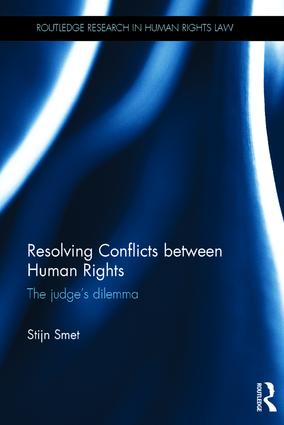November 23, 2016
 I am most pleased to announce the publication, with Routledge, of my book Resolving Conflicts between Human Rights: The Judge’s Dilemma. The book is based on my PhD research. Its first 20-odd pages – including the entire introduction – can be consulted here. This should give interested readers a good idea of what the book is about.
I am most pleased to announce the publication, with Routledge, of my book Resolving Conflicts between Human Rights: The Judge’s Dilemma. The book is based on my PhD research. Its first 20-odd pages – including the entire introduction – can be consulted here. This should give interested readers a good idea of what the book is about.
This is its first page:
Under the influence of the global spread of human rights, legal disputes across the globe are increasingly framed in human rights terms. In a myriad of court cases the world over, opposing parties can invoke human rights norms in support of their competing claims. Take, for instance, a labour dispute in which a church invokes its religious freedom to shield it from the complaint of a lay employee, who claims that his dismissal for having engaged in an extramarital relationship has violated his right to privacy. Or take the case of a politician who sues a newspaper for defamation, claiming that a corruption story on the newspaper’s front page has breached her right to reputation. Or the case of an adopted person who seeks a court order for the disclosure of information related to her origins, against the express wishes of her biological mother, who had given birth to her anonymously.
When confronted with such cases in which human rights conflict, judges face a dilemma. In ‘traditional’ human rights cases, in which human rights are opposed by the public interest, the former arguably function as ‘trumps’ over or ‘shields’ against the latter. Human rights, in other words, hold special normative force over the public interest invoked to justify their infringement. In ‘traditional’ human rights cases, the scales of justice are thus loaded in favour of human rights. When human rights conflict with each other, however, there are no ‘trumps’ to be played or ‘shields’ to be wielded. Instead, often difficult choices have to be made between superior norms that deserve principled equal respect. I do not mean to imply, here, that ‘traditional’ human rights cases are always easy to resolve, nor that conflicts between human rights invariably make for complex cases. But human rights conflicts do pose particular challenges for adjudication. Those challenges are identified and tackled throughout this book.
The central argument of this book is that human rights conflicts are uniquely problematic, in that they are special kinds of hard cases that require a distinct resolution framework. The need for such a distinct framework flows directly from the special normative force of human rights, as ‘trumps’ over or ‘shields’ against the public interest. Taking the special normative force of human rights seriously, I posit, necessitates a departure from the proportionality test in the specific domain of human rights conflicts. Throughout this book, I question the relevance of the proportionality test, ubiquitous in human rights reasoning, to conflicts between human rights. Instead, I propose an alternative (or refined) framework, specifically designed to tackle the hard cases in which human rights collide.
2 Comments
Congratulations!!
[…] Resolving Conflicts between Human Rights: The Judge’s Dilemma, Stijn Smet, Routledge […]